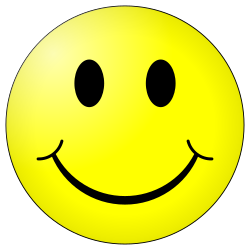Smiley
A smiley (also called a "smiley face" and an "emoticon") is a picture of a smiling face that is used to show emotion. The first smileys to be widely used were made as yellow buttons, but now the most common smileys are made using computer keyboard symbols. Smileys are used by many people in emails and other types of computer messages. A "smiley" is also sometimes spelt wrongly as "smily" or "smilie".
History
Smiley button
There were a number of early uses of simple graphics representing a smiling face. Some of these used a large circle containing two dots for eyes and a curve for the mouth. The most well-known smiley face was created in 1963 by Harvey Ball for an insurance company in Massachusetts. This design was a bright yellow circle representing a face, with black oval eyes and a big curved mouth with smile creases at the ends.
The design was made popular in the early 1970s by a pair of brothers, Murray and Bernard Spain, who though of a great plan to sell novelty items. The two used the "smiley face" on buttons as well to decorate coffee mugs, t-shirts, bumper stickers and many other things. They also used the phrase "Have a happy day" (which was the idea of Gyula Bogar). "Smiley" buttons were very popular from the 1970s onwards.
Smileyworld Ltd
Smiley is a brand developed by Franklin Loufrani since 1971. He controls Smileyworld Ltd, a company whose mission is to make the world a happier place to live. Its brand Smiley is sold all over the world in several lifestyle industries, and its designers are constantly developing very creative and edgy products. The company donates ten percent of its royalties to a charity called the Smiley World Association, active with social actions in several countries. Its baseline is "Share your smile with those in need".
In 1997 Franklin's son Nicolas Loufrani has started to create a new world with icons based on the original Smiley logo. Today over 1200 icons are used as part of a brand called Smileyworld. This brand is based on a communication concept aimed at helping people to communicate better through various social expression products (greeting cards, gifts, etc.). It is also an educative project with books, toys, interactive products as well as a lifestyle brand for children.
Legal
Smiley has been a registered trademark since 1971. The Smiley name and logo now registered and used in over 100 countries for 25 classes of goods and services. More than 1200 Smiley emoticons are registered with the Washington Library of Congress and protected by the Universal Copyrights Convention. In the past 10 years, Smileyworld Ltd Archived 2020-01-28[Date mismatch] at the Wayback Machine has signed more than 800 licensing contracts worldwide and has been using its rights in most classes of goods and services in all important countries on the 5 continents. Smileyworld Ltd works with over 60 law firms to protect its IP.
Emoticon
In the 1990s people started using the internet and emails as a regular way of communicating. So that they could show happiness or fun in an easy way, people started making little smiling faces using some of the symbols on the keyboard. A keyboard smiley has a colon ":" for the eyes, a hyphen "-" for the nose, and a parenthesis ")" for the mouth. Some people make the smiley without the hyphen for a nose. The "smileys" that are made in this way are sideways.
Here is a smiley:
- :-)
When you tilt your head to the left, it looks like a smiling face.
Smileys are usually used as part of a written message, but sometimes a smiley is just sent on its own to say "I am happy with your last message." Smileys are a useful way to show feelings to someone who cannot see the face of person sending the message.
- A smiley is usually used to show happiness: "I bought a new computer today! :-)"
- A smiley can show that the sender does not want to hurt a person's feelings: "That was a silly thing to do! :-)"
- A smiley can show that the sender is joking or being sarcastic: "Don't you think tests in school are really fun? :-)"
From the smiley came other ideas for showing emotions using keyboard symbols:
- :-) ... Smiley
- ;-)... I'm winking! (used to flirt with someone via text, mail, etc.)
- :-D ... I'm very happy!
- x-D ... I'm laughing!
- :-( ... I'm frowning!
- :-| ... I'm bored!
- :-o ... I'm surprised!
- :'( ... I'm crying!
- :-s ... I'm worried!
- {:-o .. I'm going crazy!
- :-P ... I'm poking my tongue out!
- x-P ... That's disgusting!
- <:o) .. Let's have a party!
Some people use different symbols, or do not use a nose, etc.
Smiley Media
An example of an emoticon smiley face (represented using a colon followed by a parenthesis) used in direct communication, as seen in this screenshot of an email.
The smiley face of Sabritas named Oscar, having an open mouth.
"Authentic Worcester-made smiley face", by Harvey Ball
Smiley ball at London 2012 Olympics
The Watchmen comic series logo








